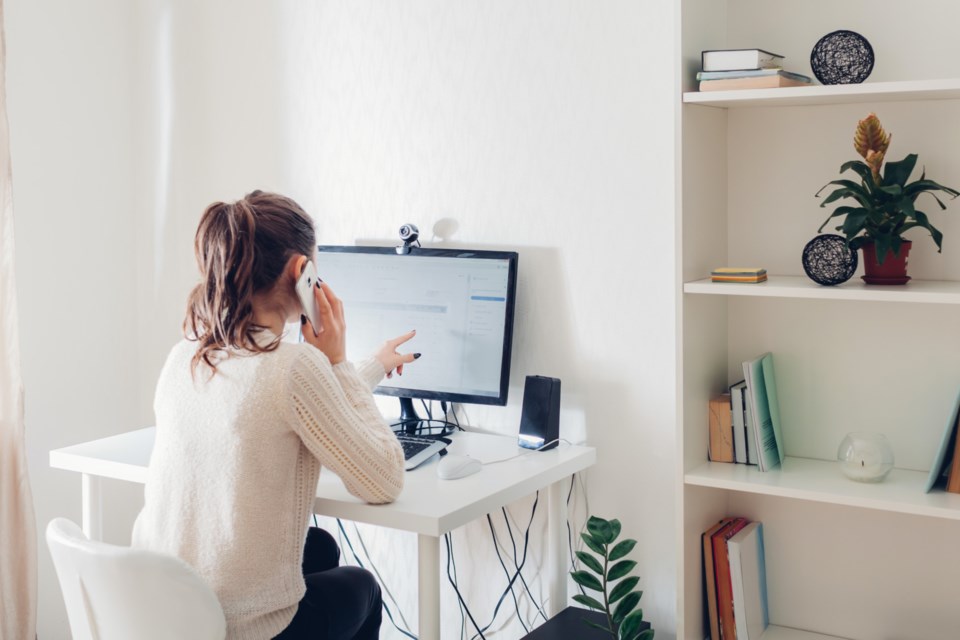As companies across Canada get their employees set up to work from home amid the coronavirus pandemic, many may consider making it a permanent switch.
Barbara Bowes from HR consulting firm Legacy Bowes Group says the workforce has shown it can evolve to include more people doing their jobs from home.
“I think this has been a revolution. It was something that was thrown at us, but we have found that working from home has really been working quite well,” Bowes said.
“I think that from an employer’s perspective, they can save so much money from rental spaces; they will seriously take a look at how they can balance how much time and who is in the office through technology. It is going to change the way we work altogether.
“COVID-19 has proven that it works.”
A recent survey from Statistics Canada found that approximately 4.7 million Canadians who do not usually work from home did so during the week of March 22 to 28.
When you add in the people who were already working from their home office, four in 10 Canadians were working from home that week, according to StatCan.
Bowes says there are challenges for both employees and employers when people are working in their own homes.
“We are hearing two different sides. Number 1, if you’re on your own without a partner or without children, I am hearing people have been more productive,” she said, noting that parents have had to balance added child-care duties when schools or daycares are closed.
COMMENTARY: Working from home with kids — is that sustainable for the long term?
Bowes says some of the benefits people have experienced include being able to sleep in longer if they don’t have to commute to work, having more flexible workdays and squeezing in laundry during a coffee break, but there are also some downsides.
“Not everyone has a workplace space at home. It’s not that you have your laptop on your ironing board, but you probably have it on your dining room table if you’re not accustomed to working from home, and the chair doesn’t fit or help. The physical capabilities of being comfortable at home or work isn’t there,” she said adding that other things employees are struggling with are the lack of human interaction and feeling isolated.
It’s a feeling Nicole Chappellaz, owner and founder of Assiniboine Rehabilitation and Wellness Group in Brandon, Manitoba, can relate to.
“Definitely that has been difficult,” said Chappellaz.
“It’s definitely harder to connect, not just with people but with your co-workers, the ones that know what your job is and can support you if you had a bad Skype meeting or a telephone call that was a little bit more stressful than usual.”
Chappellaz adds she’s in a unique position, as she had been mostly working from home prior to the outbreak of COVID-19, but had just rented an office space.
“One of the reasons why I did rent an office was because it was beginning to be too much to live and work in the same place. Especially in the colder months there’s some weeks where I wouldn’t leave my house for a few days, and it just got to be a little bit too much,” Chappellaz said, but adds in the short-term, working from home has its perks.
“I find the pace is a lot less hectic. I don’t necessarily need to keep the same office hours day to day, so there’s a lot more flexibility in that sense.”
Bowes adds that employees are now taking on some of the costs associated with working from home and should consider talking to their employer.
“To me, it’s fair that the employer take a look at cost sharing some of those expenses. You’ve got the internet, the phone and even the laptop. Maybe you didn’t have a laptop for the individual so they’re using their own personal equipment. I don’t think right now a lot of employers are doing that,” she said.
If employers are finding benefits in their staff working from home, Bowes says now is when they should look at making the adjustments permanent.
“COVID is scary and everyone is fearful, but from the work opportunity, it’s offering a big opportunity to reflect on how you do things and to make changes now where people are open to change,” she said. “When we get back into our other old ways of working, that ability and willingness to change will drop.”
Psychologist Dr. Syras Derksen says as businesses begin the process of people returning to work, it can leave employees feeling anxious about the process.
“It’s really challenging because you’ve spent a lot of time being told by officials and the government that it’s not safe to go out and you haven’t been experiencing going out and interacting with people the same way. When you do that the first time it’s going to be anxiety provoking,” he said.
Derksen says there are a number of things people can do to cope.
“As you challenge your anxiety and as you do the activities that you haven’t done before and things are ok, your anxiety will likely reduce over time. It’s one of them ost tested and proven things in psychology,” he said.
“The unfortunate thing is this is going to be tough in the beginning. But the fortunate thing is that it’s going to improve over time.”
Derksen says being mindful and staying in the moment as well as consciously working through a worst-case scenario in your mind can help you feel more in control.
- Global News
